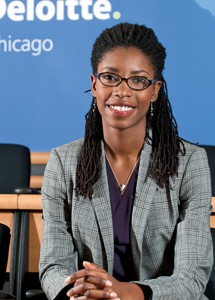When Alice Ndikumana, BSBME ’11, was a biomedical engineering major, researching cardiac arrhythmia in the laboratory, she assumed she would pursue a PhD and launch a research career. Instead, she discovered a passion for business operations during a summer internship between her junior and senior years.

On the factory floor at cosmetic maker L’Oréal, she came to appreciate the thrill of immediate impact. “When you’re in a lab, you study things for a really long time,” says Ndikumana, who minored in applied microeconomics. “In the manufacturing plant, we actually produced something every day.”
When school resumed, recruiters from the management consulting industry made their annual campus appearance to talk to the campus chapter of the National Society of Black Engineers, for which she served as president. On the heels of her L’Oréal experience in business operations, a consulting career began to make a lot of sense. Before her senior year was half over, she had accepted a position with Deloitte Consulting in Chicago to begin right after graduation.
Today, Ndikumana, a technology consultant at Deloitte focusing on health care, finds herself on the front lines of one of the most hotly contested policy debates in U.S. history: health-care reform under the Affordable Care Act. “I never thought I’d get so close to the action,” says Ndikumana, who was born in the central African nation of Burundi and grew up in Amherst, Mass.
Ndikumana is the daughter of two Wash. U. alumni. Her mother, Gaudence, earned a master’s degree in social work from the Brown School. Her father, Léonce, a professor of economics at the University of Massachusetts in Amherst and a member of the U.N. Committee for Development Policy, earned his PhD at the university.
Ndikumana, who chose Chicago because of its proximity to many of her friends, advises health-insurance companies on how to implement technology to meet the mandates of the Affordable Care Act, such as the creation of health-insurance exchanges and the standardization of administrative transactions. There are also fundamental changes in how insurers issue policies, since they can no longer turn down applicants with pre-existing conditions, and in the rating factors they use to set premiums, she explains.
“As you can imagine, these types of things would have a significant impact on the process of creating a new product, the process of calculating the rates, their process for how they interact with providers to pay bills,” Ndikumana says. “All of these process changes require changes to their underlying technology. What management consultants do is help to manage that process.”
Working on health-care reform has been an eye-opening experience for the 24-year-old. “I don’t think I understood how extensive the ACA was. There are a lot of moving pieces, which makes it very exciting. I watch the news and it’s really relevant [to my work],” Ndikumana says.
“I want to eventually start to learn how we can make changes to impact the overall wellness of our population.”
Alice Ndikumana
Ndikumana hopes to continue developing her knowledge of the health-care industry at Deloitte — and beyond. After working in consulting for a few more years, she plans to return to school for a graduate degree in business administration or public health. What she does know for sure: She wants to stay in the health-care policy field. “I want to eventually start to learn how we can make changes to impact the overall wellness of our population,” she says. “I like things that are complex, and there are a lot of very interesting problems with health care today. I want to be involved someday in helping to fix them.”
While her present role may seem a far cry from both her engineering education and her laboratory experience, her training has been a big help so far in her job as a consultant. “With an engineering degree, especially from Wash. U., you learn how to think analytically to solve a problem,” Ndikumana says.
Robin Schatz is a freelance writer based in New York City.